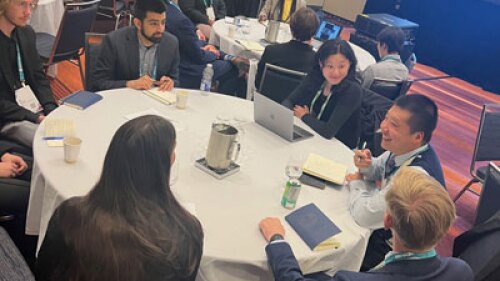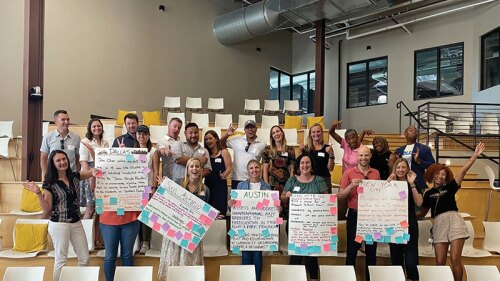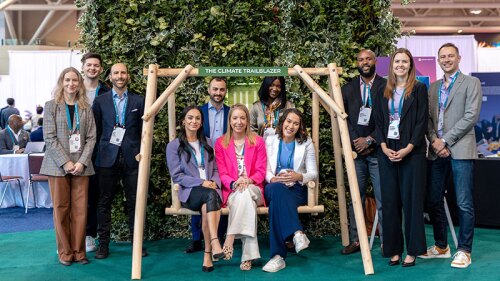Toledo, Ohio, a city that has seen its share of economic decline in the past, has recently experienced a series of economic wins that are resulting in the rapid redevelopment of its urban core. Since 2014, nearly 4,000 new jobs and $3 billion in investment within the manufacturing, high technology, and health care industries has poured into the downtown area, as noted by its department of economic and business development.
A key catalyst for growth was triggered back in 2015, when ProMedica, a locally owned nonprofit health system, announced the consolidation of its 25 regional offices into a single headquarters campus on Toledo’s riverfront that will soon support 2,000 staff members. A surge in demand for both commercial and residential properties soon followed.
Over the last two years, ProMedica spent $46 million, including $5 million in state historic preservation tax credits, to repurpose and expand the former Toledo Edison steam plant, a site that previously lay vacant for three decades. Since then, more than $500 million of additional investment has come from several developers and businesses. By the end of 2017, residential occupancy rates in downtown Toledo is expected to reach 96 percent. In response to the city’s expanding local workforce, 36 new development projects are under construction or have been completed.
“Our city has been waiting a long time for this,” remarked Sandy Spang, city council member-at-large. “There’s a real sense here that this is Toledo’s moment, so we need to maximize it by applying intelligent, long-term planning.”
Last year, Spang participated in an UrbanPlan for Public Officials workshop held during the National League of Cities conference. She was instantly inspired by the session, and thought that others could similarly benefit. After garnering support from ULI and Toledo’s public and private sector experts, Spang succeeded in bringing the program to her hometown.
In July, the first UrbanPlan for Public Officials workshop to be delivered to a single jurisdiction was held at the Toledo-Lucas County Public Library. A group of local decision makers engaged in the program, including the commissioner of housing, the chief building officer, Toledo’s mayor, and members of the planning commission, citizens’ boards, and city council.
Participants spent the day role-playing as competing development teams to respond to a hypothetical request for proposals (RFP) for the redevelopment of a site in a fictitious town. Teams examined the basics of a pro forma and funding of a complex project; the economics of different building types and community benefits; the different time horizons for the public and private sectors; the risk associated with lengthy negotiations among all parties; and the importance of a clear and open process in the selection of a private partner.
“I was happy to host the UrbanPlan for Public Officials workshop in Toledo, and was grateful for the opportunity to participate,” said Paula Hicks-Hudson, mayor of Toledo. “The workshop was both challenging and enjoyable, and I hope that the elected officials were able to experience a new and different role in the economic development and urban planning process.”
“It was wonderful to work with elected officials during the session, since often we are sitting across the table from each other on opposite sides of an issue,” added event sponsor Megan Foos, CEO of the Toledo Regional Association of Realtors. “I think it gave all of us a different perspective and will make communicating in the future more successful.”
Although each team was presented with varying hypothetical growth challenges, economic and budgetary constraints, and difficult trade-off scenarios, participants marveled at the relevance of the exercises.
“Even though we worked with a model, it felt so real,” remarked Brandon Sehlhorst, manager of real estate for Toledo’s department of economic and business development. “It was so easy to substitute the mock scenarios we used in the workshop with an uptown area of Toledo we’re in the middle of planning right now.”
When asked in a post-workshop evaluation whether they would now view economic development projects differently in the future, participants agreed unanimously that their perspectives had broadened.
“It was eye-opening,” said Matt Cherry, a member of city council. “As elected officials, we tend to listen to the most vocal constituents. But this program helped us deepen our understanding of the entire picture. As our city experiences this incredible growth, it’s essential that we develop a plan that is sustainable in the future.”
For more information about UrbanPlan and how to introduce it in your community, contact Sophie Lambert, UrbanPlan national director, at [email protected], or Sean Geygan, UrbanPlan associate, at [email protected].




